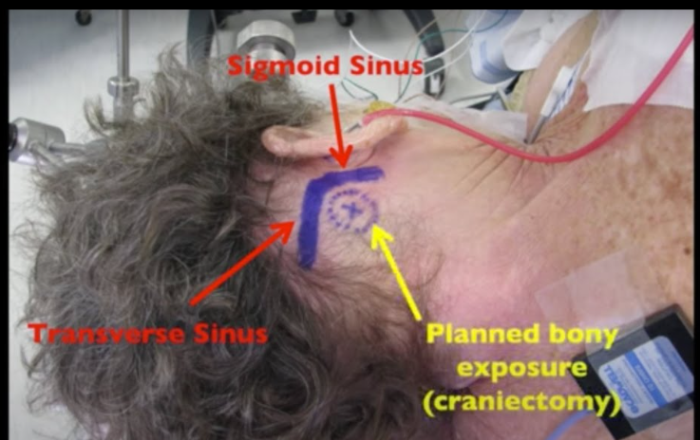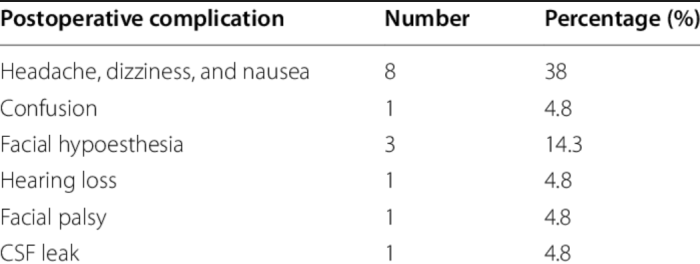Microvascular Decompression (MVD) Surgery is a highly effective procedure used to treat conditions like trigeminal neuralgia and hemifacial spasm. However, like any surgical intervention, MVD surgery carries certain risks and potential complications. These may range from nerve damage, infection, and hearing loss to more serious issues like stroke and cerebrospinal fluid leaks. Understanding these risks can help patients make informed decisions and ensure proper post-operative care to minimize complications. In this blog, we'll explore the potential complications of MVD surgery, how to prepare for them, and what can be done to mitigate their impact.
Medical disclaimer: This content is for general awareness and does not replace a doctor’s consultation. For diagnosis or treatment decisions, consult a qualified specialist.
What Is Microvascular Decompression (MVD) Surgery?
Microvascular Decompression (MVD) is a surgical procedure designed to relieve pressure on nerve roots, commonly performed for trigeminal neuralgia and hemifacial spasm. The procedure involves the careful separation of blood vessels from the affected nerves, which can alleviate the pain or spasms caused by these conditions. Despite its effectiveness, patients must understand the risks involved, which may vary based on the individual's health and the complexity of the surgery.

The Importance of Understanding MVD Surgery Risks
Being aware of the potential risks and complications associated with MVD surgery is crucial for patients. It helps in making informed decisions regarding the procedure and ensures proper planning, pre-surgical tests, and post-operative care. With a clearer understanding of what could go wrong, patients can work closely with their medical teams to minimize these risks.
Common Risks Associated with MVD Surgery
Common risks of MVD surgery include nerve damage, bleeding, and infection. Each of these risks can lead to serious outcomes such as prolonged pain, facial weakness, or prolonged recovery time. However, with proper surgical techniques and aftercare, the majority of these risks can be effectively managed.

Bleeding Risks in MVD Surgery: What You Should Know
Bleeding is a known risk in any surgical procedure, and MVD surgery is no exception. While most cases involve minimal bleeding, excessive blood loss can occur, particularly in patients with pre-existing vascular conditions or poor blood clotting. Surgeons usually manage this risk with precision, but patients should be prepared for possible transfusions or further medical intervention if required.
Infection After MVD Surgery: Causes and Preventive Measures
Infection after MVD surgery is a potential risk that can occur at the surgical site or in deeper tissues. This can lead to delayed healing, increased pain, and further complications. Preventive measures, such as antibiotics and sterile surgical techniques, play a vital role in minimizing this risk. Patients should follow post-surgery care instructions carefully to reduce infection risks.
Potential Hearing Loss: A Rare but Serious MVD Complication
One of the rare but possible risks of MVD surgery is hearing loss. The procedure takes place near the auditory nerve, and although the risk is low, damage to this nerve during surgery can affect hearing. Surgeons take extra care to avoid this, but patients should discuss the possibility with their healthcare provider beforehand.
Facial Weakness or Paralysis: Is It a Likely Outcome?
Facial weakness or paralysis is an uncommon but serious complication that can occur after MVD surgery. This may happen if there is damage to the facial nerve or if there is swelling around the nerve pathways. Although it is rare, patients should be aware of the signs and consult their doctor immediately if any such symptoms arise post-surgery.

Understanding the Risk of Cerebrospinal Fluid Leaks
In some cases, cerebrospinal fluid leaks can occur after MVD surgery. This can lead to headaches, nausea, or more severe complications. The leak may happen due to pressure on the dura mater during the procedure. Proper surgical techniques and post-operative monitoring are essential to minimize this risk.
Recognizing the Symptoms of Trigeminal Neuralgia and Hemifacial Spasm: When to Seek MVD Surgery
Learn to identify the key symptoms of trigeminal neuralgia and hemifacial spasm that may require MVD surgery for relief.
Non-Surgical Treatments Before MVD Surgery: Exploring Your Options
Explore non-surgical treatments such as medications and physical therapy that may provide relief before considering MVD surgery.
The Risk of Stroke During Microvascular Decompression Surgery
Though stroke is an extremely rare complication of MVD surgery, it can occur due to complications involving blood vessels in the brain. Blood clots, excessive bleeding, or damage to the cerebral arteries during the procedure can cause a stroke. The risks are generally minimized with skilled surgeons and advanced surgical technology.
Best Microvascular Decompression (MVD) Treatment in India
The Best MVD Treatment in India is performed by expert neurosurgeons who use advanced techniques to relieve nerve compression, providing a customized treatment plan to ensure optimal patient outcomes.
Microvascular Decompression (MVD) Surgery Cost in India
When considering the microvascular decompression (mvd) surgery cost in india, patients benefit from transparent pricing and cost-effective treatment options at leading hospitals, without compromising on the quality of care.
Allergic Reactions to Anesthesia in MVD Surgery
Allergic reactions to anesthesia are rare but can happen during MVD surgery. Symptoms may include skin rash, breathing difficulties, or heart irregularities. An experienced anesthesiologist will monitor the patient closely to prevent and treat any reactions that may arise during surgery.
Understanding the Risk of Spinal Fluid Imbalance
Spinal fluid imbalance can occur when the normal flow of cerebrospinal fluid is disrupted during MVD surgery. This may lead to issues like headaches, dizziness, or long-term complications. Surgeons are trained to prevent such imbalances, but in rare cases, additional interventions may be necessary.
Long-Term Complications: Post-Surgical Changes in Sensation
Patients may experience long-term changes in sensation, such as persistent numbness or tingling after MVD surgery. These changes can occur due to nerve manipulation during the procedure and may be temporary or permanent, depending on the extent of nerve damage.
MVD Surgery and the Possibility of Recurrence
While MVD surgery is highly effective, in rare cases, symptoms may return after the procedure. This could happen if the blood vessels once again compress the nerve or if the initial decompression wasn’t fully successful. Patients need to monitor their symptoms closely after surgery and seek medical advice if issues persist.
The Role of Surgical Precision in Minimizing MVD Risks
Surgical precision plays a key role in minimizing the risks associated with MVD surgery. Advanced imaging techniques and skilled surgical techniques ensure that the risk of complications like nerve damage or bleeding is minimized. Patients should choose a highly experienced surgeon to ensure the best outcomes.
Managing Risks: How Experienced Surgeons Reduce Complications
Choosing an experienced MVD surgeon is crucial to reducing complications. A skilled surgeon can anticipate potential risks and use advanced techniques to minimize them. Patients should inquire about the surgeon's success rate and experience with MVD surgery before proceeding.
Anesthesia Complications: The Overlooked Risks in MVD Surgery
While anesthesia is generally safe, complications like nausea, vomiting, or severe reactions can occur in rare cases during MVD surgery. A careful preoperative assessment can help reduce these risks by tailoring the anesthesia plan to the patient’s specific needs.
The Risk of Vascular Damage During MVD Surgery
Vascular damage is a rare but serious risk during MVD surgery. It can occur if the surgeon accidentally cuts or damages a blood vessel during the procedure, leading to bleeding or clotting issues. Such complications are minimized with precision and modern surgical techniques.
Long-Term Recovery and Possible Complications After MVD Surgery
Long-term recovery after MVD surgery may include complications like chronic pain or sensory changes. However, most patients experience significant symptom relief. It's important for patients to follow their recovery plan and attend follow-up appointments to monitor for any emerging issues.
Post-Surgical Complications: When Should You Seek Medical Help?
Post-surgical complications such as fever, severe pain, or signs of infection may require medical attention. It’s essential for patients to be vigilant during their recovery period and seek help promptly if symptoms indicate a potential issue.
The Importance of Post-Operative Care in Reducing Complications
Post-operative care is key to preventing complications after MVD surgery. Following instructions for wound care, medication schedules, and activity restrictions can greatly reduce the risk of infections, swelling, and other complications.
Minimizing the Risk of MVD Surgery Through Preoperative Evaluation
A comprehensive preoperative evaluation helps identify any risk factors that could increase the likelihood of complications during MVD surgery. This includes assessing the patient’s overall health, conducting imaging studies, and reviewing medical history.
How to Prepare for MVD Surgery to Avoid Risks
Preparing for MVD surgery involves both physical and mental preparation. Patients should follow their doctor's pre-surgery instructions carefully, including fasting, avoiding certain medications, and arranging post-surgery transportation and care.
Understanding the Success Rate vs. Complications in MVD Surgery
MVD surgery boasts a high success rate, with most patients experiencing significant symptom relief. However, it's important to weigh the potential for complications against the benefits, based on individual health conditions and surgical expertise.
The Future of MVD Surgery: Are New Techniques Reducing Risks?
New surgical techniques and advanced imaging technologies are continuously evolving in MVD surgery, making the procedure safer with fewer risks. Ongoing research and development aim to improve the precision and outcomes of the surgery, reducing complications like nerve damage or stroke.
1. What is the main risk of MVD surgery?
The primary risks include nerve damage, infection, and bleeding. In rare cases, stroke or hearing loss may occur.
2. How can I prepare for MVD surgery to minimize risks?
Proper preparation involves following preoperative instructions, maintaining good health, and having a thorough evaluation with your healthcare provider.
3. Is facial weakness a common complication after MVD surgery?
Facial weakness is a rare but possible complication, usually due to nerve damage during the procedure.
4. Can MVD surgery lead to permanent disability?
Permanent disability is rare but can happen due to complications such as stroke or severe nerve injury.
5. How long does recovery take after MVD surgery?
Recovery times vary, but most patients take 4-6 weeks to recover fully, depending on their health and the success of the surgery.
6. What is the success rate of MVD surgery?
MVD surgery has a high success rate of over 80%, with many patients experiencing significant symptom relief.
7. What should I do if I notice signs of infection after surgery?
Seek immediate medical attention if you experience symptoms such as fever, redness, or swelling around the surgical site.
8. Are there non-surgical alternatives to MVD surgery?
Yes, alternatives such as medication, radiotherapy, and botox injections may be offered, depending on the severity of the condition.
9. Is there a risk of recurrence after MVD surgery?
While rare, recurrence of symptoms can happen if the initial decompression isn’t fully successful or if there’s a new vessel compression.
10. How can I prevent complications after MVD surgery?
Following post-surgical care, staying mobile, and attending regular follow-up appointments can significantly reduce the risk of complications.